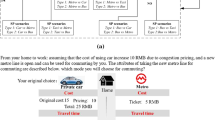Abstract
Most modal split models have been based on the assumption of rational behaviour in an individual's choice evaluation of the generalised costs of modal alternatives. This paper integrates conceptual and empirical information from a wide range of sources and points towards an alternative way of looking at modal choice. The main conclusion is that the car is usually perceived as the superior mode for vehicular travel and that the potential user is committed to its use largely through the act of purchasing it. The conceptual structure of a sequential modal split model is outlined as one that is based on a four-stage decision-making framework which considers the role of learning and habit-formation. In the conclusion, the implications of this approach are considered in terms of the conventional modal split and trip generation submodels, and certain policy measures are assessed.
Similar content being viewed by others
References
Banister, D. J. (1976a). “The Concept of Car Availability and its Application to Modal Split Modelling.” Unpublished PhD Thesis, University of Leeds.
Banister, D. J. (1976b). “Transport Mobility and Deprivation in Inter-Urban Areas.” Paper presented to the IBG Social Geography Group Conference — Open University.
Banister, D. J. (1977). “Car Availability and Usage: A Modal Split Model Based on these concepts.” University of Reading, Department of Geography, Geographical Paper No. 58.
Baum, H. J. (1973). “Free public transport,” Journal of Transport Economics and Policy, 7(1): 3–19.
Beckmann, M. J. and L. D. Burns (1976). “A theory of household automobile allocation decisions,” Transportation Science, 10(1): 42–84.
Bly, P. H. (1976). “The Effects of Fares on Bus Patronage,” Transport and Road Research Laboratory, Report LR 733.
Bostick, T. A. and T. R. Todd (1966). “Travel Characteristics of Persons living in larger Cities,” Highway Research Record, No. 106, (Washington Highway Research Board), 52–57.
Deslauriers, B. C. (1975). “A Behavioural Analysis of Transportation: Some Suggestions for Mass Transit,” High Speed Ground Transportation Journal, 9(2): 13–20.
Dix, M. C. (1976). “Unstructured Household Interviews as a Means of Investigating the Travel Decision Process,” UTSG, January, Aston.
Dobson, R. (1975). “Towards an analysis of attitudinal and behavioural responses to transportation systems characteristics,” Transportation, 4: 267–290.
Domencich, T. A. and D. McFadden (1975). Urban Travel Demand. Amsterdam: North Holland.
Everett, P. B., S. C. Hayward and A. W. Meyers (1974). “The Effects of a Token Reinforcement Procedure on Bus Ridership,” Journal of Applied Behaviour Analysis, 7(1): 1–9.
Ewing, R. H. (1974). “The nature of travel decision making,” Transportation Research Report, 526: 66–72.
Golledge, R. G. (1969). “The Geographical Relevance of Some Learning Theories,” 101–145 in K. R. Cox and R. G. Golledge,″ Behavioural Problems in Geography, North Western University Studies in Geography No. 17.
Golledge, R. G. and L. A. Brown (1967). “Search Learning and the Market Decision Process,” Geografiska Annaler, B, 49(2): 116–124.
Goodwin, P. B. (1977). “Habit and hysteresis in mode choice,” Urban Studies, 14: 95–98.
Gwilliam, K. M. and D. J. Banister (1977). “Patterns of car usage and restraint modelling,” Transportation 6(4): 345–364.
Hartgen, D. T. (1974). “Attitudinal and situation variables influencing urban mode choice: some empirical findings,” Transportation, 3: 377–392.
Hartgen, D. T. and G. H. Tanner (1970). “Choice of travel mode and considerations in travel forecasting,” Highway Research Record, 369.
Harvey, D. (1969). “Conceptual and Measurement Problems in the Cognitive Behavioural Approach to Location Theory,” in Cox, K. R. and R. G. Golledge, Behavioural Problems in Geography, North Western University Studies in Geography, No. 17.
Hill, W. F. (1972). Learning, University Paperbacks.
Hooper, P. O. and P. Mullen (1974). “The effect of Increased Fuel Prices on Car Travel,” Traffic Engineering and Control, 15(16/17),728–730.
Jones, P. M. (1976). “An Investigation of Household's Response to Car Restraint and other Policy Measures,” Warwick: PTRC, July.
Jones, P. M. (1977). “Forecasting Family Response to Changes in School Hours: An Exploratory Study,” Glasgow: UTSG, January.
Khan, A. M. (1971). “Transport policy decision analysis: a decision theoretic framework,” Socio Econ Plan Sci, 5: 159–171.
Khan, A. M. (1972). “Transport policy decision analysis: recent developments in the techniques of investment planning,” High Speed Ground Transportation Journal, 6(1), 7–26.
Lancaster, K. J. (1966). “A new approach to consumer theory,” Journal of Political Economy, 74: 132–157.
Lovelock, C. H. (1975). “Modelling the modal choice decision process,” Transportation, 4: 253–265.
Lucarotti, P. S. K. (1974). “Car Availability.” Warwick: PTRC, July.
Lucarotti, P. S. K. (1977). “Car availability — the fundamental modal split,” Transportation Planning and Technology 3: 203–213.
McGillivray, R. (1970). “Demand and choice models of modal split,” Journal of Transport Economics and Policy, 4(2): 192–207.
Mercadel, M. (1970). “The Choice of Means of Transport — Psychological Motivation and Econometric Approach,” Transportation in France and in the World, 3rd Round Table of the ECMT.
Metcalf, A. E., J. Markham and B. P. Feeney (1977). “Elasticity of demand for petrol in Ireland: the evidence of cross sectional analysis,” Traffic Engineering and Control, 18(3): 119–121.
Mogridge, M. J. H. (1977). “An Analysis of Household Expenditures 1971–1975,” Warwick: PTRC, July.
Pratt, R. H. (1970). “A utilitarian theory of travel mode choice,” Highway Research Record, 322, 40–53.
Sheth, J. N. (1975). “A Psychological Model of Travel Mode Selection.” Discussion Paper, University of Illinois.
Skinner, B. F. (1957). “The experimental analysis of behaviour,” American Scientist, 45:343–371.
Sommers, A. N. (1970). “Towards a theory of traveller mode choice,” High Speed Ground Transportation Journal, 4(1), 1–9.
Thomas, K. (1976). “A reinterpretation of the attitude approach to transport mode choice and an explanatory empirical test,” Environment and Planning A, 8: 793–810.
Wootton, H. J. and G. W. Pick (1967). “A model for trips generated by households,” Journal of Transport Economics and Policy, 1(2): 137–153.
Author information
Authors and Affiliations
Rights and permissions
About this article
Cite this article
Banister, D. The influence of habit formation on modal choice —a Heuristic model. Transportation 7, 5–33 (1978). https://doi.org/10.1007/BF00148368
Issue Date:
DOI: https://doi.org/10.1007/BF00148368




